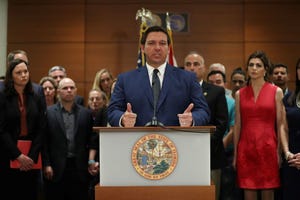Ag agencies facing another potential shutdown
Legislative Watch: Funds expire for USDA, FDA operations; RMA roadshow to highlight livestock policies; Biden extends suspension of EU steel, aluminum tariffs.
January 5, 2024
Congress returns to session Monday after a three-week holiday break. Rather than easing into 2024, lawmakers are immediately facing yet another government funding showdown. Funds expire Jan. 19 for four of the 12 annual appropriations bills, including the bill covering USDA and FDA operations.
If funding is not secured prior to expiration, a partial government shutdown would begin Jan. 20. Lapses in funding were narrowly averted several times in 2023, but continued disagreements could cause the first shutdown in five years. The most recent incident was the longest in history, lasting 35 days in December 2018 and January 2019.
In the event of a shutdown, only essential activities continue until funding is restored by Congress. The Biden administration would make individual determinations regarding which government functions are essential and which are not. In past such instances, all food safety inspections have continued, as well as any other activities that are necessary to ensure the safety of human life.
RMA roadshow to highlight livestock policies
USDA’s Risk Management Agency is taking its show on the road to meet with producers across the country. RMA says its “RMA Livestock Roadshow” will be “a series of workshops for producers to learn about updates and improvements to several livestock risk management products.”
Each session of the livestock roadshow will include discussions on coverage products such as annual forage; dairy revenue protection; livestock gross margin; livestock risk protection; pasture, rangeland and forage; and weaned calf risk protection. Farmers and ranchers can talk with RMA officials about these and other livestock-related insurance programs offered by the agency.
RMA is hosting virtual sessions on Jan. 8 and 17 that will also be available later as recordings. Agency officials will conduct nine in-person sessions around the country between Jan. 10 and March 7. Sessions will be held in Alaska, California, Illinois, Minnesota, Mississippi, Oklahoma, South Dakota and Wisconsin. Details can be found on the agency website.
Biden extends suspension of EU steel and aluminum tariffs
Three days after Christmas, the Biden administration announced it was suspending tariffs on European Union steel and aluminum for an additional two years. The tariffs, initially imposed by President Trump, taxed European steel at a 25% rate and aluminum at 10%. Biden suspended the tariffs in January 2022, implementing a tariff rate quota system in their place.
Trump’s actions were met by retaliation from Brussels, which imposed tariffs on American products such as whiskey, motorcycles and boats. When Biden suspended the Trump steel and aluminum tariffs, the EU also paused its retaliatory rates. Had an extension not been struck before Jan. 1, tariffs as high as 50% on American whiskey exports would have snapped back into place.
The two-year extension of the TRQ allows the EU to ship up to 3.3 million metric tons of steel and 384,000 metric tons of aluminum to the U.S. tariff-free through the end of 2025. During this period, the U.S. and EU plan to negotiate an agreement to pursue greener steel production and excess capacity in non-market economies like China.
About the Author(s)
You May Also Like





